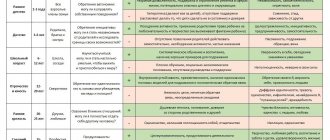What is personality
The concept of personality characterizes a person as a being endowed with consciousness, using it in the process of communication, intellectual activity, work, and interaction in society. A person has a unique character, exhibits an active life position, is aware of his actions and accepts responsibility for them.
There are no identical personalities, since each person has his own life experience, mental characteristics, congenital and acquired qualities. You might think that animals are also different from each other, but this does not make them individuals. After all, a person is a part of human society, performing certain functions in it, playing its roles.
Many people wonder at what age does a person become an individual? But there is no exact answer; everyone goes through this process individually, at their own time. We can talk about the beginning of personality formation if the child separates himself from the people around him and understands his place among family members and relatives. Then he begins to compare himself with his peers, other children. Thus, personality gradually develops from childhood.
This is interesting! Children under 1 year of age are not able to distinguish themselves in the mirror. They watch with interest the reflection that appears, but still cannot understand that it is themselves. Often the baby tries to look behind the back of the mirror, wanting to find another child there. But from 12-16 months, children already establish a connection between themselves and the emerging reflection. This is one of their first “steps” towards self-knowledge and development of themselves as individuals.
Personalities can be very different: positive and negative, developed and backward, sincere, mean, benevolent and others. It all depends on a set of individual qualities that are formed from early childhood.
Basic characteristics of a person
All philosophers, at all times, could not and still cannot give an exact definition of the word “man”. Of course, there were a lot of attempts, there were names: a reasonable person, a playing person, and a doing person.
Here are several definitions of the concept of man as interpreted by various philosophers:
Marx: “Man is an animal that produces tools.”
Hegel: “Man is a mammal with a soft earlobe.”
Nietzsche: “Man is an animal that knows how to promise”
No one can give a precise definition of the concept of a person; a person is too versatile and universal in his actions and deeds, in his thoughts, and therefore does not cover any of the definitions. In principle, this concept can only be defined through the qualities of negation, that is, through those in which there is a particle not, negative. For example, not predetermined, irreplaceable, unique, irreducible, inexpressive. But also, these qualities do not indicate the limitations or inferiority of a person, but rather the individuality of nature and character.
Now let's look at these five concepts in detail:
· - Not predestination. A person cannot always be independent. His life depends on many factors that play a big role in his life, such as climate, heredity, family culture and much more. When any factors intersect, accidents occur or events occur that are simply impossible to predict. A person can predict many climate changes, but he will not know what will happen to him tomorrow. Many philosophers in ancient times spoke about fate. Not a single event strictly determines our life unambiguously. People should not resist internal things, only internal factors should hinder him. Scientists also say that almost all people have tails. They can be wealth, high positions, stupid things a person does, etc. they say that a wise man has no tails.
· — Irreplaceable. A person is irreplaceable in the main form only for himself, he must find his place in the world. The entire theory of the world is basically based on this. Every person in the world has something to do that no one else can do. And if he doesn’t do this job, then there will be an unfilled place in the universe. These cases can be so different both in quality and in the strength of execution. Every activity, even the simplest one, should bring great joy and satisfaction, so that later you will not be ashamed of the work done.
· - Unique. This concept is fundamental in characterizing a person. All people are unique and inimitable. The most important thing is for a person to be able to find a place in life, to engage in a business where he would become inimitable and unique. This uniqueness can be traced through the example of famous people. No one else would have written famous works, or invented great equipment, or been great commanders, but anyone can also say what he felt and experienced when he read about these achievements, saw, listened, etc. . And his experiences also complement the universe, like the works of great people. Each person is individual, and he lives as he likes, and no one has the right to judge him if he is satisfied with his life.
· - Irreducible. Man cannot be reduced to his biological species. If he is assigned to monkeys, he will grow up to be a monkey; if he is assigned to dogs, he will grow up to be a dog. But the big difference from animals is that man is not reducible to natural conditions, he can adapt to any climate, to any food. A person is absolutely irreducible, he does not coincide with a single thing, nor with a job, etc. if a person devotes himself completely to his work, then he is no longer just a person, but he is most often called “a cashier person”, “a builder person”, “a driver person”, etc. people often use expressions in their speech such as: “I have succeeded as a cook”, “I have succeeded as a director, teacher... etc.”, but a person will never say to himself that he has succeeded as a person. A person has a program in his head from birth; he needs to become someone, be sure to get a profession. But it often happens that a person becomes a professional in his field, learns all the smallest subtleties of his profession, he begins to understand that the most important thing is to remain a person in any situation. It is important in every type of activity, no matter who you become, to remain just a person, a simple ordinary person. But for us, in fact, it’s not so simple. Every person strives to become much better than others, more beautiful, smarter, more successful, richer, etc. as philosophers say, a person is nothing, because he is constantly in development, his activity does not end and is not limited in comparison with, for example, animals, which have not changed for several decades and certainly will not change now. The most appropriate negative definition is nothing, since all positive concepts limit it.
· Ineffable. Any thing or event can be explained thanks to another, but it is impossible to explain what a person is. Since it cannot be reduced to any things, theories, events, it is impossible to explain it through anything else. No external object can study and know a person. In order to find out at least something about a person, thousands of tests have been invented with various questions, but this method of knowledge only works when a person sincerely answers the questions without lies. And this will be completely impossible if a person lies or fantasizes. Still, although not much, it can be learned from his work. In fact, a person is a mystery that, unfortunately, no one will most likely ever be able to solve. Knowing oneself is the basis of human nature and history, and if we unravel it, then our history will come to an end. To summarize, we can say that the key to our happiness is ourselves, this is what we are: our personality, the individuality of each person individually, because individuality is constantly present with us and does not depend on situations. Also, a person’s individuality does not depend on fate. Therefore, a person’s individuality must be considered a value.
Qualities inherent in personality
Personality is the totality of a person’s qualities. Each personality has its own unique set of qualities, there are a lot of them, sometimes one contradicts the other. So, a good-natured person may have greed in his character. He treats people around him well, but never lends money or gives expensive gifts.
Distinctive personality traits are:
- Worldview. This is a whole system of views on the world, ideas about it, values that can be realistic or illusory.
For example, a seven-year-old boy, Vasya, believes that all doctors are cruel and evil. He formed this opinion after Vasya suffered from a purulent sore throat. The doctor gave him injections for a whole week; a strong painful reaction was left in the boy’s memory for a long time.
But the worldview can change over time, so, having matured, Vasya will understand that he was mistaken about doctors in childhood.
- Character. Each person has a set of personal characteristics and qualities that determine his behavior. Character is closely related to emotionality, so excessive sensitivity can lead to touchiness, hot temper makes a person angry.
- Degree of responsibility . You can tell whether a person is serious or not by his actions. Individuals who are constantly late, fail to fulfill their obligations, promises, or refuse responsibilities are called irresponsible. A responsible person, on the contrary, strives to bring all matters to the end, keeps his word, and is responsible for his own actions. Such people are always respected and valued in society, they are entrusted with responsible tasks, and appointed to higher positions.
- Self-esteem. An individual can distinguish himself from the rest of society and evaluate his own activities, appearance, habits and other characteristics. Self-esteem is developed through the process of comparing yourself to others.
Self-esteem largely determines how society will accept a person and whether others will love him. You can notice how in the school class they tease narcissistic children who do not respect teachers and peers, considering themselves superior and much better than others. But guys with low self-esteem are also shunned; they often have few friends due to shyness and indecisiveness.
- Mental capacity . From birth, everyone has their own intellectual potential, that is, the ability to develop their minds. But a person can surpass his natural abilities thanks to perseverance, determination, and his work.
Example. Petya Ivanov has innate mathematical abilities. But he gets 4s and 3s because of laziness and unwillingness to do his homework. Sasha Sidorov is not good at mathematics, but he devotes a lot of time to extracurricular activities, and has already begun to earn his first A's.
If desired, a person can develop his memory, logical thinking, willpower and even physical abilities.
The qualities of a person’s personality are manifested and developed in the process of communication, interaction and work activity.
What characteristics does an individual have?
Any individual has certain characteristics by which he can be distinguished from the mass of his own kind.
:
- The first such sign is the presence of two components: social and biological. A person is born as a biological individual, and only in the process of further development does he assimilate social norms and values, knowledge and skills, and form his own worldview. Thus he becomes a social organism.
- The second sign is the psychological essence of his worldview. A worldview in itself is a system of beliefs and views on the surrounding reality.
- The third sign is the integrity of a person’s worldview and beliefs. It exists if a person’s views on the world and his behavior do not contradict each other. Integrity is violated if a person is forced to be guided by ideas that do not correspond to his worldview.
- The next sign is awareness of one’s place in the social system. An individual’s search for his place in life is an important theme in many works of world culture. Often a situation arises when a person cannot determine what place in life he occupies and where he strives. This is a serious psychological problem, and such a person should contact a specialist who will direct his strength in the right direction.
- Another important sign is the interests and needs of the individual. This is quite a volatile matter; When social conditions change and while they are poorly formed, a person’s interests and needs, being narrowly focused, limit the individual’s worldview. And this does not allow him to fully realize his potential, try new activities and realize himself in different areas: a person is afraid that he will not succeed and will fail.
- Another important characteristic of a human individual is responsibility. This feeling distinguishes man from animals. Responsibility is the awareness that you need not only to use the benefits provided, but also to fulfill some obligations yourself, to do something for others. Responsibility allows us to continue successful activities in the future. In addition, responsibility is often encouraged by society, not only morally, but also financially.
- Self-control, self-control, self-discipline are another quality of an individual. It allows you to achieve true success in any field and be truly free. Being capable of self-organization, a person will not become dependent on anyone.
The listed characteristics of an individual may indicate the success of a person in life. Everyone has their own set of signs and the degree of their expression, and this determines the strengths and weaknesses of people. And since there is competition and struggle in society, then the one who has the most personal characteristics, and as developed as possible, wins it. The struggle can be invisible when people with different “personality strengths” collide. Or it can be obvious and attract everyone’s attention if approximately equally strong personalities collide with each other. Each of them wants to take a dominant position, no one wants to give way. And it happens that such personal competition develops into a real conflict, including an armed one.
Individual and individuality
An individual is a separate representative of the human race by virtue of his birth. The qualities of an individual are manifested in his appearance: eye shape, leg size, hair color, and so on. An individual has innate inclinations and abilities, but will become an individual only in the process of social development.
The concept of individuality is different from the concept of individual. Individuality is the characteristics of an individual, its uniqueness, originality. It includes intellectual, spiritual qualities and physical characteristics. Individuality manifests itself when a person makes choices, makes independent decisions, or engages in any activity.
The concept of individuality is inextricably linked with personality. The relationship between the concepts of individuality and personality is manifested in the fact that a person who is an individual will necessarily demonstrate his individuality in interaction with society.
How psychologists view this term
An individual is called the exact bearer of all the traits that are given to humanity. But in psychology, the term individual is characterized by the integrity of the psychophysical organizations of the body, its activity, as well as resistance to manifest actions. A person lives as an individual from the beginning of his birth until the moment of death. This condition is the initial one on the planet from the point of view of its phylogenetic formation, as well as ontogenetic development. It is a concrete product of the creation of life, which actively interacts with a variety of surrounding criteria, and not a series of conditions that appeared suddenly. One thing is clear: it is impossible to consider a personality without close attention and emphasis on his individual characteristics.
They thus act as the foundation of human content. It is on them that a number of conditions for the development of each representative of the human race will depend, that is, on the inclinations that were invested in him at the genetic level. An individual has a number of basic functions, and specifically there are two of them. One is classified as conservation, thanks to which the process of distribution of energy and dynamic characteristics occurs, as well as a number of resource characteristics. But the other one is responsible for the function of so-called changes, from the point of view of plasticity of behavior.
How and in what environment personality is formed
Personality is formed in the process of interaction with other people: parents, family, friends, teachers, work colleagues and others. The process of personality formation is long and complex, impossible without socialization. Socialization is the individual’s acquisition of values, rules of behavior and norms accepted by society.
Socialization begins in early childhood, when parents teach their children by example and educate them. While reading a fairy tale, the mother explains to the baby which heroes are bad, what good and evil are, and what a good person should do. Gradually, the child develops basic standards of morality, ethics, the concept of what is good and what is bad.
Socialization continues with entry into school. There, the child is influenced by teachers, classmates, and school administration. Gradually, a person’s social circle expands, he establishes contact with a large number of people. Socialization continues throughout life, that is, personality formation is a continuous process.
This means that personality changes over time, character or individual qualities change, and new physical and intellectual characteristics appear. Thanks to the knowledge of personality characteristics at each age, an entire science was created - Developmental Psychology. This does not mean that at a certain age people become the same, but they exhibit common features and qualities characteristic of a given age.
Example. It can be noted that adolescents in adolescence exhibit common character traits: hot temper, stubbornness, and susceptibility to the influence of peers. Old people exhibit other characteristics: slowness, constant worry about their well-being.
Features of man as an individual
Each generation, sooner or later, asks the question of what information was contained in it. Man himself is a phenomenon, and he has a number of basic properties and requirements with which he has been awarded since birth. A person is forced to obey from a very early age not only the laws of the universe, but also all the numerous rules of society. We can call the functioning of an individual within this framework a continuation of the process of evolution. It has already been proven that every year human properties and qualities only become more complex and all these changes are included in the characteristics of an individual. A person will be considered with all his natural properties, as well as the fundamentals with which psychology has awarded him, and temperament will be at the head.
The influence of society on personality
Personality and social environment are inextricably linked. Its future depends on the environment in which a personality is formed. Seeing bad examples and irresponsible behavior in front of him, the child perceives this as a model. After some time, he may begin to behave the same way as his friends and people close to him. He may start drinking, smoking, stealing, without knowing that such behavior is the result of formed views on the world, the bad influence of his immediate environment.
Sometimes a person can fall under the bad influence of the social environment despite his desire. A schoolboy begins to smoke, fearing the ridicule of his classmates, who have long been addicted to cigarettes. A teenager decides to steal because of his friends’ obsessive persuasion to get easy money. An employee deceives his superiors after much persuasion from his colleague.
The positive influence of the environment on personality development is also manifested. Seeing before him examples of successful, happy and respected people, the child strives to imitate them and copy their behavior. Therefore, at school a lot of time is devoted to studying the biographies of national heroes, patriots, and outstanding personalities. A good example becomes an inspiration for work, creative activity, and activity in society.
Different structures of society have varying degrees of influence on the individual.
- Parents and close relatives have the greatest influence when raising a child from infancy.
- Second in terms of influence are school teachers.
- They are followed by friends, acquaintances, colleagues.
- The media play an important role (mass media: Internet, television, print media).
In addition, the individual is influenced by the socio-cultural environment characteristic of the state and the area in which he lives. So in Russia, the USA, India, Israel - the conditions for the formation of a personality are significantly different. Thanks to this, individual peoples and the population of different countries have their own distinctive character traits and individual characteristics.
The impact of the individual on society
The role of the individual in the development of society is also high. Let's look at an example of how a person influences society:
- A.V. Suvorov is a famous Russian commander, enjoyed great respect among the soldiers. He managed to win many battles in which the enemy army was several times larger than the Russian one. The soldiers loved and respected Suvorov so much that they went into any battle without fear, under his leadership. Thus, thanks to the personal qualities of a military leader, Russia won victories in many wars.
- The famous inventor Henry Ford created an assembly line production of cars, thanks to which the car became an affordable means of transportation for many Americans.
- Nicolaus Copernicus was the first to reject the idea that the Earth is stationary, suggesting that it rotates around the Sun and on its own axis. His works subsequently led to many different discoveries.
Thus, the influence of the individual on society and society on the individual are interconnected.











